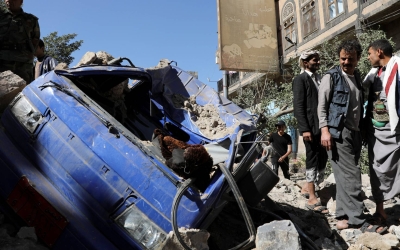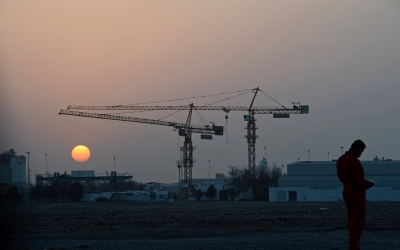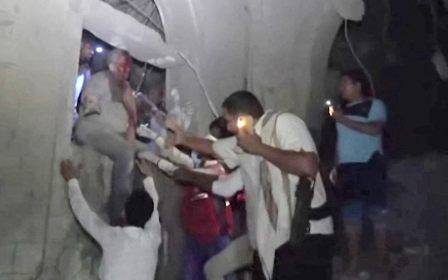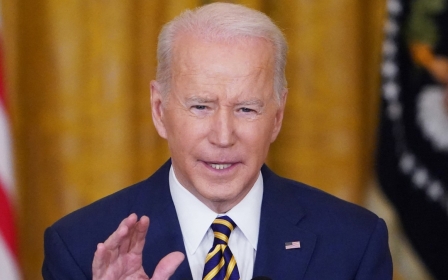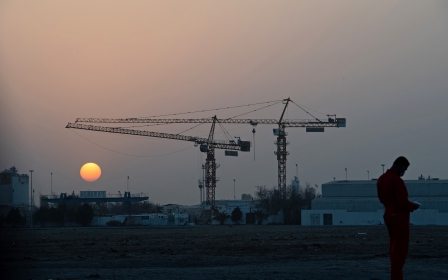Yemen: Scores killed in Saudi-led air strike on Houthi-run detention centre
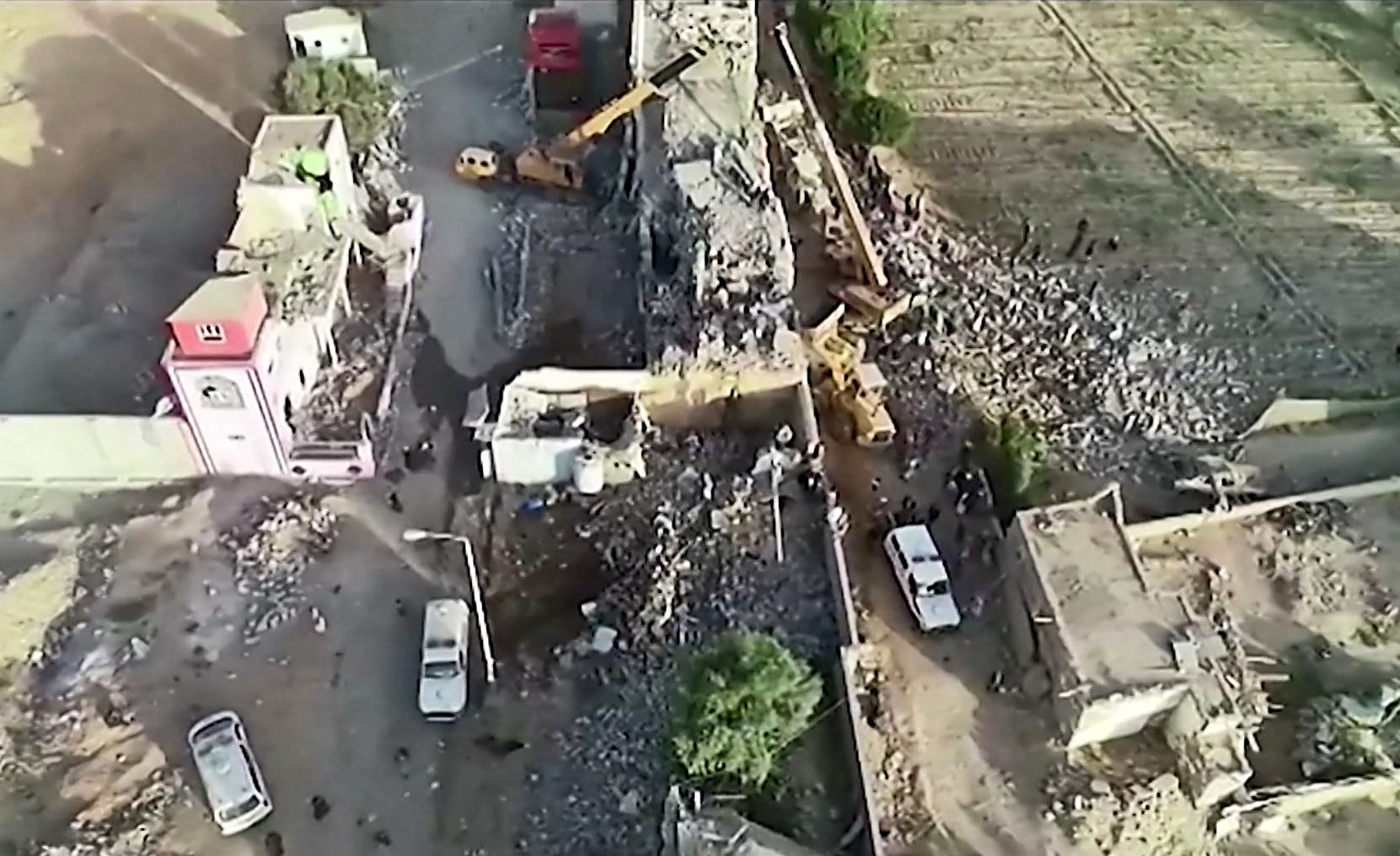
A "horrific" air strike on a temporary detention centre in northern Yemen has left more than 100 people dead or wounded, while a separate attack shut down the country's internet, as Saudi-led reprisals following a Houthi drone attack on the UAE have intensified.
Basheer Omar, a spokesperson for the International Committee of the Red Cross, said numbers were still rising following the Friday dawn attack in Saada, the home city of the Houthi rebel movement.
"There are more than 100 killed and injured... the numbers are going up," said Omar, citing hospital figures.
Ahmed Mahat, the head of mission in Yemen for the medical NGO Medecins Sans Frontieres, called the incident a "horrific act of violence" and said it was "impossible to know how many people have been killed".
"From what I hear from my colleague in Saada, there are many bodies still at the scene of the air strike, many missing people. Al-Gumhourriyeh hospital in the city has so far received around 200 wounded, and they say that they are so overwhelmed that they cannot take any more patients."
New MEE newsletter: Jerusalem Dispatch
Sign up to get the latest insights and analysis on Israel-Palestine, alongside Turkey Unpacked and other MEE newsletters
United Nations Secretary-General Antonio Guterres condemned the attack on Saturday, calling for an investigation and accountability.
Footage released by the Houthis on Friday showed rescue workers pulling bodies from the rubble following the raid on the prison, which has been used as a detention centre for migrant workers transiting through the war-ravaged country.
Reuters quoted a witness as saying several of those killed were African migrants.
The Saudi-led military coalition supporting the internationally recognised government has intensified air strikes against what it says are Houthi military targets after the Iran-aligned group conducted an unprecedented air assault on the UAE on Monday as well as launching further cross-border missiles and drones towards Saudi cities.
Further south, in Hodeidah, video footage showed bodies amid rubble and dazed survivors after an air attack on a telecommunications hub. Yemen suffered a nationwide internet blackout following the attack, a web monitor said.
A statement from Save the Children said three children were killed in the attack on Hodeidah.
"Yemeni voices are already not heard well enough. So with the internet and telecommunications being down, people will be dying in a slow death while the world doesn't know," Afrah Nasser, a Yemen researcher for Human Rights Watch, told Middle East Eye.
"In legal terms, bombing civilian infrastructure is a war crime. So this is brutal, this is terrible for the civilians, for aid workers, for civilians, for the civil society organisations, for our human rights partners that we work with on the ground. How can we get reports out of Yemen?"
The Saudi-led coalition on Saturday denied targeting the detention centre, the Saudi official news agency SPA reported.
"The coalition will inform the Office for the Coordination of Humanitarian Affairs in Yemen and the International Committee of the Red Cross on the facts and details," the state news agency said, citing a coalition spokesman.
Warnings of reprisals
The war in Yemen erupted in September 2014 when the Houthis seized the capital, Sanaa, sparking a civil war that forced President Abd Rabbuh Mansour Hadi to seek refuge in Aden and then Saudi Arabia.
The kingdom and its allies intervened in March 2015 and have since carried out more than 22,000 air strikes in an effort to roll back the rebels, with one-third striking non-military sites, including schools, factories and hospitals, according to the Yemen Data Project.
The UN has estimated the war had killed 377,000 people by the end of 2021, both directly and indirectly through hunger and disease.
The world body has also declared Yemen the "world's worst humanitarian crisis," as heavy artillery and air strikes have hampered access to health care and increased pressure on the few facilities that are still functioning.
UAE presidential adviser Anwar Gargash warned earlier this week that the country would exercise its right to defend itself after the 17 January Abu Dhabi attack, which was claimed by the Houthis.
"The Emirates have the legal and moral right to defend their lands, population and sovereignty, and will exercise this right to defend themselves and prevent terrorist acts pursued by the Houthi group," he told US special envoy Hans Grundberg, according to the official WAM news agency.
Speaking to MEE on 20 January, US lawmaker Ro Khanna, a staunch critic of the war, said Washington needed to immediately end all military support afforded to the Saudi-led coalition and instead "focus on diplomacy" to end the conflict.
"This dangerous escalation in Yemen has to stop. For years the Saudi-led coalition has been pounding civilian areas and infrastructure in Yemen and recently escalate[d] those strikes. Earlier this week we saw a horrific Houthi drone and missile attack that killed three civilians in UAE," Khanna said.
"To bring this war to a close, we must use the only leverage we have, which is on the Saudi-led coalition, and end US military support to focus on diplomacy to secure a political solution and life-saving aid for one of the world’s largest humanitarian crises."
This article is available in French on Middle East Eye French edition
Middle East Eye delivers independent and unrivalled coverage and analysis of the Middle East, North Africa and beyond. To learn more about republishing this content and the associated fees, please fill out this form. More about MEE can be found here.


